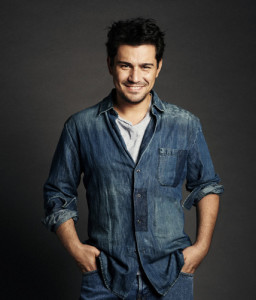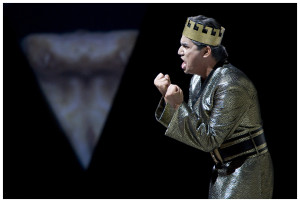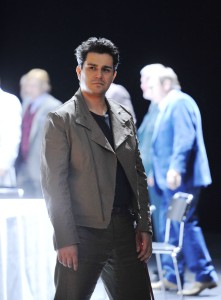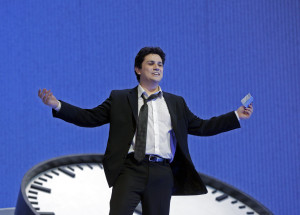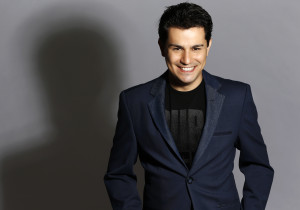Der albanische Tenor Saimir Pirgu schoss fast über Nacht zu internationalem Star-Ruhm empor – und das mit nur 21 Jahren. Inzwischen ist er kein Geheimtip mehr, sondern eine feste Größe im internationalen Operngeschäft. Seine prachtvolle lyrische Tenorstimme und sein sexy Aussehen lassen ihn heute einen der wirklich gesuchtesten jungen Künstler sein, den wir schon lange auch einem deutschsprachigen Publikum vorstellen wollten. Anlässlich seine Edgardo in Lucia di Lammermoor in Los Angeles interviewte ihn unser Kollege Matthew Richard Martinez von ConcertoNet.com und war so liebenswürdig, uns das Gespräch zur Verfügung zu stellen, wofür wir ihm und ConcertoNet.com sehr danken. Im Folgenden ein umfangreicher Auszug aus dem Interview, das im März in Los Angeles gehalten wurde (Foto oben Fadil Berisha). G. H.
How long have you been in Los Angeles? I’ve been here for three weeks. I like being here because the weather is fantastic. There’s sun every day. I spent this last winter in Europe and to be here in the sun is much better. I’m very happy!
How are you liking this new production of Lucia di Lammermoor? It’s a very interesting production. It uses a lot of special effects and everything is going well. I’m very happy with my Lucia, Albina Shagimuratova, and James Conlon. We’ve known each other for many years and worked together often. I’m very positive. Edgardo a role that I like a lot. You can tell a lot about a tenor from this role: his acting, his bel canto, etc. You can tell exactly what you want the public to know.
t’s a little unusual in that you get the last word in this opera which is fun. But it’s not so fun! If you have such a good soprano, everybody is waiting to go home after the Mad Scene and they have to listen for thirty minutes for the death of the tenor! The tenor needs to be very good to make it interesting for the public after the Mad Scene. This is my third time in Los Angeles. The first time Plácido Domingo invited me to debut in the United States in Gianni Schicchi in a production directed by Woody Allen. It was a big deal for me because I was debuting in the United States, in L.A., and with Woody Allen and James Conlon. I thank Plácido every time I see him! Then I returned for Così fan tutte with James Conlon and now with Lucia. Every three years I’m here. I like this company very much. They do beautiful work and we have good chemistry with everybody here.
What do you enjoy about working with Maestro Conlon? We don’t just work together, we are friends. We meet each other in Italy, Vienna, and L.A. I know his family, he knows mine. It’s not just work and respect we have for each other. It’s closer. He knows me very well. He likes voices and I’m happy to work with people who really like beautiful voices. He is one of the conductors such as James Levine and Riccardo Muti, they are the generation who had the opportunities to work with the great singers. They worked with everybody. Everything they say helps you. When I work with Conlon, everything he suggests makes me better. He doesn’t make things more difficult. He’s a wonderful conductor but he’s a really good man. I’m very happy. When I’m here, I’m home.
Speaking of great conductors, you worked with Claudio Abbado who recently passed away. What was that experience like? I made my debut in Così fan tutte with him when I was just twenty-one , and then everyone was calling: Vienna, Salzburg Festival, all big theaters. After you do such a great production with one of the biggest conductors, people are very interested in you as a young artist. Claudio showed me the way to my career. He was the first conductor I worked with and thank God he was Claudio Abbado. Without him I wouldn’t have risen to where I am so quickly.
Twenty-one is so young to start a career even for a tenor. It must have been overwhelming for you. When you have the opportunity to work with people like Muti, Abbado, they tell you everything you need. It makes it much easier as a young artist to work with good colleagues like them and Domingo with whom I sang Traviata at the Met. They’ve done this for many years. If everyone is young, you don’t have that guidance. I’m very fortunate to work with these people. It makes you much more secure when you’re singing.
Tell me about your coach, Vito Brunetti. He’s been with you since the beginning. Yes, he knows my voice better than anybody. I met him when I was nineteen and we worked together. I never changed a thing, even when I met Luciano Pavarotti. Luciano was very surprised to find a singer who could sing with this technique at such a young age. All three of us got to be friends. It was a really beautiful time because Luciano was in Bolzano enjoying his free time and I was a student there. Together with Brunetti I visited Luciano and talked about how the voice will grow. Every role I sang for Luciano was prepared with Brunetti. I prepared the big things with Brunetti and then we brushed up everything with Luciano. It was the best combination for a young singer. This time, for me, was like a dream. Every time I’m in Italy I check in with Brunetti. We live a little away from each other but when I’m home I go visit him and sing for him to see what has happened with the voice. After a big tour I go to be sure that everything is going well.
Of course, you talked about Pavarotti. He was probably the biggest influence on you because he inspired you to be a singer, correct? All the Three Tenors did. When I saw them on television for the first time, I was about fourteen years old. Domingo was my favorite. I wanted to be one of these guys that are singing there! I was in school studying violin. I had a feeling for the music but I didn’t know one day that I would be a tenor like them. But it was a dream for me. And after ten years I was singing with Plácido Domingo at the Met and I was friends with Luciano Pavarotti. This was a big dream for me, but it turned out to be very real!
You’ve sung Rodolfo, Alfredo, these roles are slightly heavier, still lyric. Are you looking to expand your repertoire more? I think I need to stay in roles like these for ten years: Rigoletto, Lucia, L’elisir, Bohème, probably not the big French repertoire, but Manon, or Roméo et Juliette are the next roles I would love to do. I’m not ready for Werther. To be a very good Werther, you need time. You need to be in the second part of your career, not the first as I am now. It’s easy when you are so young to make a mistake with roles. I haven’t so far and I want to go on without mistakes until I get to be forty and then we’ll see what happens! I imagine that I’m ok with all these lyric tenor roles I’m doing. I have about sixteen roles, which is a lot, and it’s ok for the moment. I try to make them better every time. (…) But every year is different. If you take care of your voice, every time that you go back to singing a role it will be much better. I want to do it this way.
What do you find the biggest challenge for you technically? The combination of what is in your heart that you are trying to express to the people together with the technique of the passaggio. This helps to make a longer life for a singer. If you cover the voice, if you take care of this passaggio, your life will probably be longer as a singer. But it’s not so easy to understand this, to learn these things takes many years. I think that technique is something that is completely different for everybody. In the end you just need to sing, and if you sing well for many years it means you have a good technique. If you sing for just five or six years, you can start to talk about technique. We can talk for technique for hours, but in this job you are a winner if you can sing for many, many years. If not, forget it.
Of course one of the most amazing things about Pavarotti was how long he sang so well. But not just him, but all his generation. We have the younger generation now who are singing like this. Ramon Vargas has been singing for thirty years. He’s still singing. We have all this generation of younger tenors, Piotr Beczala, Jonas Kaufmann, they’ve been singing for nearly twenty years. They are not so young now! That means they have good technique.
What do you find most rewarding about singing this music? The energy that I have when I’m singing. I lose my mind and I lose my body when I’m singing. I work hard so that everything will go well, but something happens when I’m on stage and it’s not just me. Many other colleagues say the same thing. You are not conscious when you are singing. This energy on stage makes me very crazy but very happy at the same time. You cannot control anything. This adrenaline is the best. It’s my passion to sing live, not to record something. Every day can be different. This is the beauty of my job. It’s not my job, it’s my life.
Links: http://concertonet.com/scripts/edito.php?ID_edito=289
www.saimirpirgu.com http://www.facebook.com/saimirpirguofficial
Twitter: @saimirpirgu KKNENTERP@aol.com

